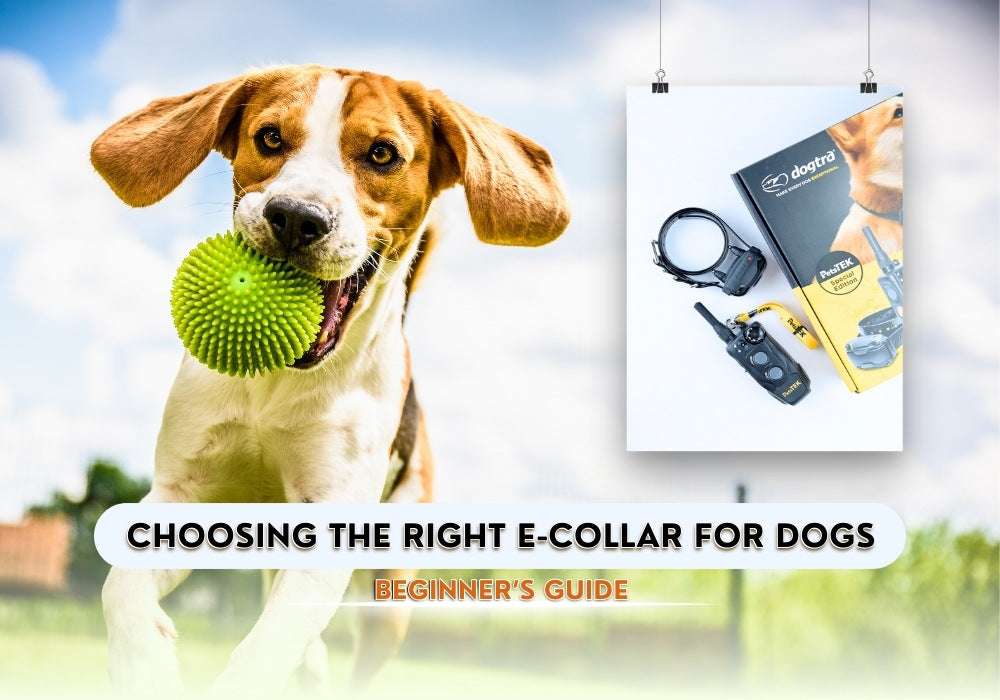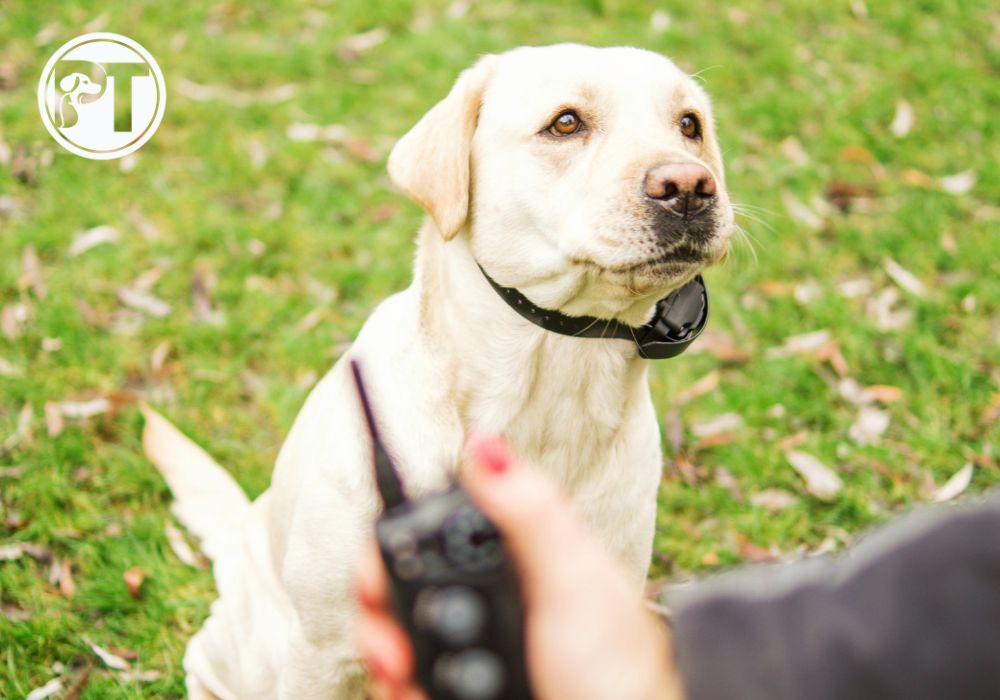5 Proven Steps to Introduce an E-Collar: Expert Dog Training Tips
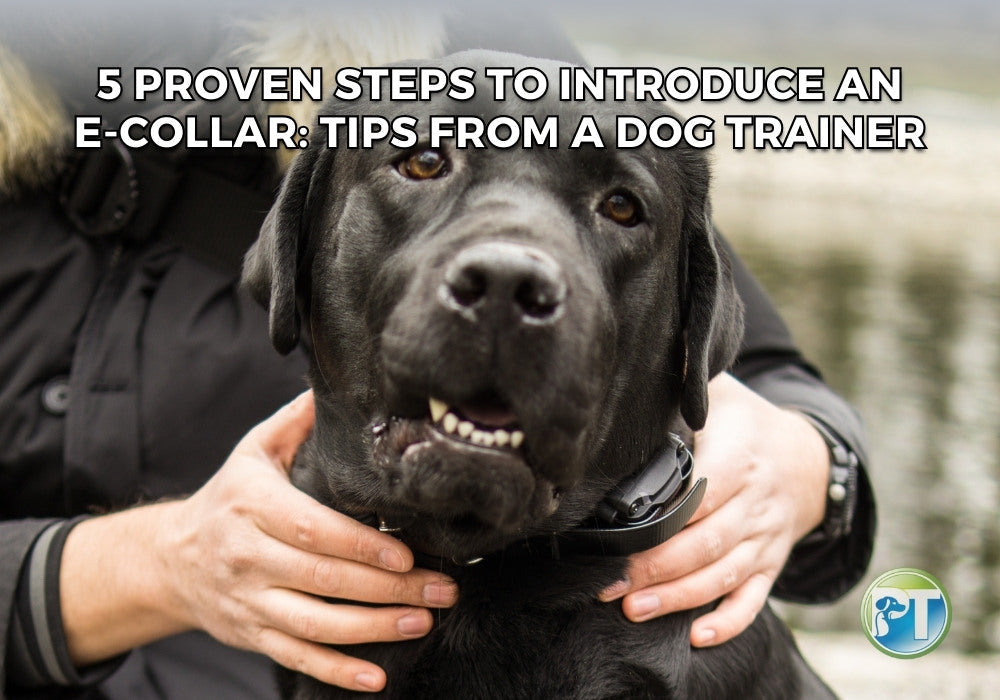
Looking to introduce an e-collar to your furry friend? Dog trainer Jessica Vigo from Primal Dog Training shares her expert insights on how to do it safely and effectively. In this blog post, we'll delve into her 5 proven steps to ensure a smooth transition.
But First, What Is an E-Collar?
An e-collar, or electronic collar, is a training tool that delivers a mild shock, vibration, or tone to get a dog's attention. It's designed to reinforce your training and improve your dog’s responsiveness. This can be especially helpful in situations where verbal cues might not suffice.
Modern e-collars come equipped with adjustable stimulation levels and built-in safety features. The key to effective e-collar training is to use the lowest setting that gets your dog's attention without causing discomfort.
5 Steps to Introduce an E-Collar to Your Dog
Introducing an e-collar to your dog can be a game-changer in training, but it’s important to do it right. Dog trainer Jessica (@primal_dogtraining) has outlined 5 steps for successful e-collar training.
Step 1: Have a Good Recall Command

Before considering using an e-collar, your dog must have a solid recall command. This means that when you call your dog, they come to you reliably, regardless of distractions. The e-collar is not a tool for teaching new behaviors; it’s designed to reinforce behaviors your dog already knows.
Why Recall is Crucial
A strong recall command is the cornerstone of e-collar training. If your dog doesn’t understand what you want them to do, the collar’s stimulation will only confuse them.
Step 2: Choose a High-Quality E-Collar
Not all e-collars are created equal. Investing in a high-quality e-collar is essential to ensure the safety and effectiveness of your training. Cheap e-collars often lack the precision and control needed for proper training and may deliver inconsistent or harsh stimulation.
What to Look for in an E-Collar
When looking for an e collar, consider the following features:
- Adjustable Stimulation Levels: Ensure the collar has a wide range of settings to find the perfect level for your dog.
- Range: Choose an e-collar with a range that suits your training needs, whether it’s for backyard training or off-leash adventures.
- Durability: Look for a collar that is waterproof and built to last, especially if your dog enjoys outdoor activities.
- Brand Reputation: Consider well-known brands that are trusted by professional dog trainers, such as Dogtra, E-Collar Technologies, SportDOG, PetSafe, or Garmin.





For more information on choosing the right e-collar, check out our beginner’s guide.
Step 3: Find Your Dog’s “Working Level”

The “working level” is the lowest level of stimulation that your dog can perceive. This is the level you’ll use during training, as it’s just enough to get your dog’s attention without causing discomfort.
How to Identify the Working Level
Here’s how you can find your dog’s working level:
- Start at the lowest setting.
Begin with the e collar set to the lowest possible stimulation level.
- Observe your dog’s reaction.
Slowly increase the stimulation level while watching your dog closely. Look for subtle signs of recognition, such as an ear flicker, head tilt, or quick glance.
- Stop when you see a response.
As soon as you notice a small, non-stressed reaction from your dog, you’ve found their working level. This is the level you’ll use during training.
Step 4: Pair the E-Collar with Verbal Commands
Once you’ve identified your dog’s working level, it’s time to start pairing the e-collar with your verbal commands. The goal is to reinforce the commands your dog already knows, such as recall, using the e-collar’s gentle stimulation.
Introducing the E-Collar with Recall
- Give the recall command and press the e collar button simultaneously.
Begin by using the recall command that your dog is already familiar with. At the same time, press the e-collar button to deliver the stimulation at the working level.
- Release the button when your dog responds.
As soon as your dog starts moving toward you, release the button. The idea is to teach your dog that the stimulation stops as soon as they respond to the command.
- Repeat consistently.
Repeat this process consistently, always using the e-collar in conjunction with the verbal command. Over time, your dog will learn that responding to the command makes the stimulation go away. This creates a positive association with the e-collar and reinforces their obedience.
Step 5: Condition Your Dog Over Time
Introducing an e-collar to your dog is not a one-time event. It’s a process that requires time and patience. The goal is to condition your dog to understand that the e-collar is a communication tool, not something to fear.
The Conditioning Process
Condition your dog to the e-collar over a period of at least 1 to 2 weeks. Start with short training sessions and gradually increase the duration as your dog becomes more comfortable. Be consistent with your commands and the use of the e collar, ensuring that your dog is always rewarded for responding correctly.
Throughout the conditioning phase, it’s essential to use plenty of positive reinforcement. Reward your dog with treats, praise, and play every time they respond to a command. The more positive associations your dog has with the e-collar, the more successful the training will be.

Common Mistakes to Avoid
Avoid rushing the conditioning process or using the e-collar as a punishment tool. The e-collar should never be used to correct behavior that your dog doesn’t understand. Always focus on reinforcing the commands they already know and ensuring that the experience is positive.
If you’re unsure about how to proceed or want personalized guidance, don’t hesitate to reach out to a professional dog trainer. With the right approach, an e-collar can enhance your dog’s training and give them more freedom to explore the world safely.
Best E Collars for Dogs
If you're considering using an e-collar, we have a few suggestions in mind for the best e-collars for dogs:
1. ET-300 Mini Educator by E-Collar Technologies
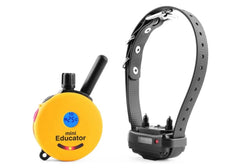
The ET-300 Mini Educator is a popular choice among dog owners and trainers. It has a ½-mile range and 100 levels of static stimulation. It also comes with a tone and vibration, ideal for sensitive and hearing-impaired dogs. This shock collar is fully waterproof and rechargeable, available in yellow, black, and Educator Zen 300 variants.
2. Dogtra 200NCPT PetsTEK Edition
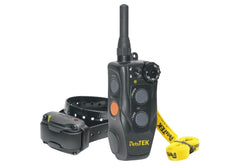
The Dogtra 200NCPT is an excellent choice for small to medium dogs. It has a 1/2-mile range, 100 stimulation levels, an audible tone, and non-stimulating vibration. Best for dogs as small as 12 pounds, it’s an e collar for basic obedience lessons and off-leash training.
3. ET-800 Boss Educator by E-Collar Technologies
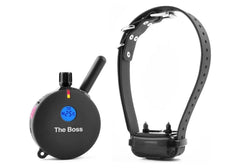
The Boss Educator ET-800 is designed for large and stubborn dogs. It has a 1-mile range, 100 levels of static, and 60 levels of boost. This e collar also comes with tone and vibration for sensitive canines. It’s a waterproof collar, recommended for dogs 20 pounds and larger.
4. SportDOG SD-425X FieldTrainer
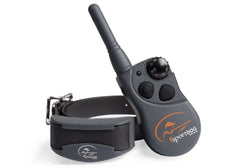
Built for basic training and hunting, the SD-425X FieldTrainer is the smallest shock collar by SportDOG. It has a 500-yard range, 21 static levels, and other training options, including tone and vibration. This is an expandable trainer for up to 3 dogs.
5. Dogtra 1900S

The Dogtra 1900S is known for its versatility and durability. Whether for obedience, competition, or K9 training, this e collar is dependable, with 127 levels of stimulation. Great for dogs 35 pounds and larger, this ecollar has a 3/4-mile radius and is fully waterproof. It also comes in a camo and black finish, as well as the Handsfree Plus version.
You might also enjoy...
-
Posted in
Dog Training, Training Tips

